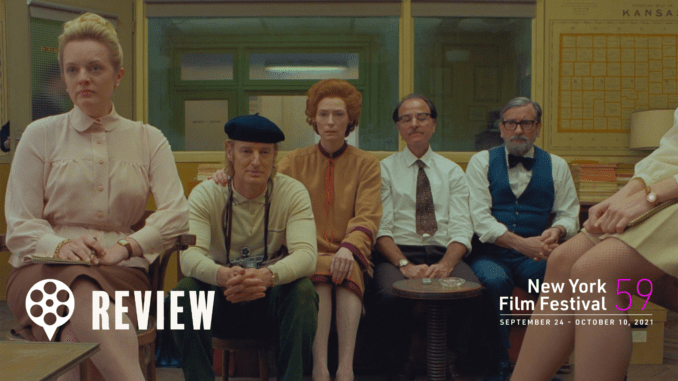
Throughout his career, Wes Anderson has cemented himself as one of the most eccentric and unique directors working today. Anderson’s visual style and aesthetic are always on full display since his debut film, Bottle Rocket, was released 25 years ago. With his previous live-action film, The Grand Budapest Hotel, Anderson finally received love from the Academy as the film was nominated for 9 Oscar nominations, including Best Director and Picture.
So it was safe to say I was fully expecting his new movie, The French Dispatch to be another winner. But, to the surprise of no one, the film is tailor-made for Wes Anderson stans. It’s rich with familiar stylistic colors, magnificent production design, and a charismatic ensemble.
With The French Dispatch, Anderson’s film shifts his narrative structure to articles in a newspaper. It follows Arthur Howitzer Jr., the editor of the French Dispatch, and is based on Harold Ross, the co-founder of The New Yorker. Arthur travels to Ennui, France, and runs the dispatch of his Oklahoma newspaper, remaining there for years and establishing it as an internationally renowned publication.
While running the dispatch, Anderson’s love letter to newspaper journalists fades into three stand-alone articles accompanied by voice-over narration by each of the journalists writing them. Here lies one of the first issues of the film because while 2 out of the 3 “articles” worked well for me, the film fails to have a narrative arc that will fully evoke passion from cinephiles.
Despite a lack of arc carrying the film’s overall trajectory, the “stories within a story” mostly worked for me. The first, and quite frankly the best of the three, follows an eccentric, corrupt art dealer Julian Cadazio played by Academy Award winner Adrien Brody. He cons the world into thinking that paintings of a deranged prison inmate Moses (Benecio Del Toro) are of incredible value. This story works best as at the core of the relationship of Moses and Simone (Léa Seydoux), who stars as his muse. Yes, the con is central to the story, but the love between Moses and Simone worked and separated this story from the rest.
In the second, a group of idealistic, Bohemian students led by Zeffirelli played Timothee Chalamet’s protest against university establishments. The charm of this story stems from the beautiful chemistry between Chalamet and Academy Award winner Frances McDormand’s Lucinda Krementz. The only deterrent from his tale is we don’t spend enough time with the two.
In turn, with these two stories, Anderson pulls back the curtain to reveal the method behind his narrative choice. Yes, there’s no overlying arc within the film, but Anderson’s first two stories examine the cynicism and disdain for the romantic people his journalists investigate. Essentially, Anderson makes light that the subject’s within these stories are shams.
Unfortunately, that disappears as the film enters its final story. In this third story, a food critic Roebuck Wright (Jeffrey Wright), covers the kidnapping of a prominent politician’s child. This story doesn’t work for me and, in turn, ruins what to that point was top-tier Wes Anderson. There’s an old saying that it’s not always about how you start, it’s about how you stick the landing that ultimately defines a film, and with The French Dispatch, that landing completely misses its mark.
Like most Wes Anderson films, The French Dispatch is masterfully crafted and offers some of the best production designs of the year. It is captured beautifully through the lens of Robert David Yeoman. The blending of color and black and white motifs shifts wonderfully and stands out as one of the film’s highlights.
Even with its faults, The French Dispatch is the most Wes Anderson film of all time. Suppose you’re already a fan of his work like I am. In that case, this film will satisfy your wishes. Unlike The Grand Budapest Hotel, this film is certainly not going to sway any critics of the director’s work, but for me, it’s never a dull moment when you enter the wonderful world of Wes Anderson.





